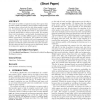Free Online Productivity Tools
i2Speak
i2Symbol
i2OCR
iTex2Img
iWeb2Print
iWeb2Shot
i2Type
iPdf2Split
iPdf2Merge
i2Bopomofo
i2Arabic
i2Style
i2Image
i2PDF
iLatex2Rtf
Sci2ools
ATAL
2008
Springer
2008
Springer
Learning task-specific trust decisions
We study the problem of agents locating other agents that are both capable and willing to help complete assigned tasks. An agent incurs a fixed cost for each help request it sends out. To minimize this cost, the performance metric used in our work, an agent should learn based on past interactions to identify agents likely to help on a given task. We compare three trust mechanisms: success-based, learning-based, and random. We also consider different agent social attitudes: selfish, reciprocative, and helpful. We evaluate the performance of these social attitudes with both homogeneous and mixed societies. Our results show that learning-based trust decisions consistently performed better than other schemes. We also observed that the success rate is significantly better for reciprocative agents over selfish agents. Categories and Subject Descriptors I.2.11 [Artificial Intelligence]: Distributed Artificial IntelligenceMultiagent systems General Terms Algorithms, Performance Keywords Trust...
Related Content
| Added | 12 Oct 2010 |
| Updated | 12 Oct 2010 |
| Type | Conference |
| Year | 2008 |
| Where | ATAL |
| Authors | Ikpeme Erete, Erin Ferguson, Sandip Sen |
Comments (0)

